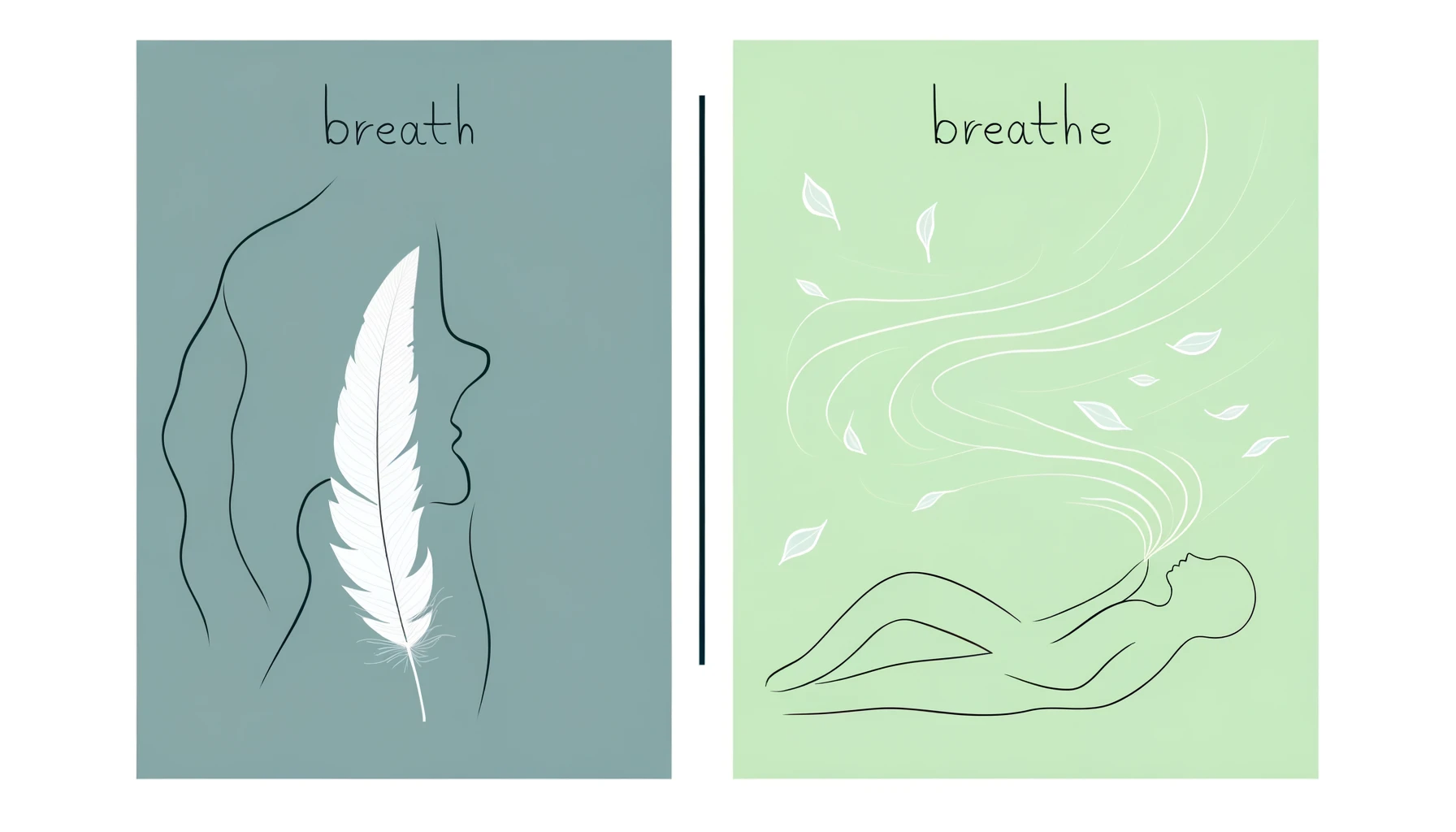
Editly Etymology: breath vs breathe
Over the course of their careers as editors, proofreaders, and AI humanizers, the experts at Editly have become masters of commonly confused words. In Editly Etymology, they tap into their own experience to offer a closer look into the horrifying beauty of the English language. This installment investigates one of the most understandably confused word pairs: breath vs breathe.
Breath Definition
Breath is a noun that means air taken into or expelled from the lungs.
Breathe Definition
Breathe is a verb that means to take air into the lungs and then expel it.
Did you catch that? Just to make sure, let’s ask AI to help us generate a visual representation of each of the words.
Breath = NOUN – the air.

Breathe = VERB - to take and get rid of the air.

Breath Root
Old English, of Germanic origin.
Breathe Root
Middle English, from “breath.”
Who is to Blame for this Confusion?
Rare is the case where guilt is so clear. It’s obviously the fault of “breath”—which is obviously the fault of Germans. Thanks a lot, Germans, you are the wurst.
AI Text on Breath
The word "breath" has deep historical roots in the English language, tracing back to Old English. Here’s a detailed look at its etymological development:
- Old English Origins: "Breath" comes from the Old English word "brǣth," which referred to the act of breathing or the exhaled breath, characterized by its smell or vapor. This term had nuances related to the quality of the air exhaled, often connected to scent or temperature.
- Proto-Germanic Roots: The Old English "brǣth" is derived from Proto-Germanic "*braþiz," which likely had a similar meaning. The concept of breath in these languages often encompassed the notions of warmth, vapor, or a gentle breeze.
- Indo-European Connections: Going further back, the word is connected to the broader Proto-Indo-European root "*bher-" (to boil, seethe) which suggests a link to notions of heat or movement. This root is also the ancestor of various words in Indo-European languages that involve notions of heat, brewing, or fermenting.
- Development and Usage: Over time, the Old English "brǣth" evolved into Middle English as "breth," and later solidified into the Modern English "breath." The term retained its core meaning related to the air taken into and expelled from the lungs.
- Modern Meaning and Usage: Today, "breath" primarily refers to the air inhaled and exhaled in breathing. It's used both in literal physiological contexts (e.g., taking a deep breath) and metaphorically to suggest life or a pause (e.g., a breath of fresh air).
The word "breath" provides an example of how a word can maintain a closely related set of meanings over centuries, reflecting fundamental human experiences and the natural world, while its linguistic form evolves more significantly. (275 words)
Humanization of AI Text on Breath
"Breath" has deep historical roots in the English language, tracing back to Old English.
- Old English Origins: "Breath" derives from the Old English "brǣth," referring to the act of breathing or the exhaled breath. This term had nuances about the quality of the air exhaled, often connected to scent or temperature.
- Proto-Germanic Roots: "Brǣth" is derived from Proto-Germanic "*braþiz," which likely had a similar meaning and encompassed notions of warmth, vapor, or a gentle breeze.
- Indo-European Connections: Going further back, the word is connected to the broader Proto-Indo-European root "*bher-" (to boil, seethe), suggesting a link to notions of heat or movement.
- Development and Usage: "Brǣth" evolved into Middle English as "breth," and later solidified into the Modern English "breath."
- Modern Meaning and Usage: "Breath" primarily refers to the air inhaled and exhaled in breathing. It's used both in literal physiological contexts and metaphorically to suggest life or a pause.
The word "breath" provides an example of how a word can maintain a closely related set of meanings over centuries, reflecting fundamental human experiences and the natural world. (183 words)
Result of Changing the AI Text to Human
Humanization has transformed the text in order to make it more readable and engaging, primarily through the elimination of repetition and tangents. In fact, humanizing the AI has reduced the original word count of 275 all the way down to 183 words—or by more than 33 percent.
AI Text on Breathe
The word "breathe" has an etymological history that is intertwined with the history of the word "breath," as both share common roots and have evolved together over time. Here’s a detailed look at the development of "breathe":
- Old English Origins: "Breathe" comes from the Old English verb "brǣðan," which means to breathe or exhale. This verb is derived from the noun "brǣth" (modern English "breath"), referring to the exhaled air that one breathes out.
- Proto-Germanic Roots: The Old English "brǣðan" traces back to Proto-Germanic "*brēþanan," which is derived from the same root as "*breþiz" (breath). The Proto-Germanic root emphasizes the act of breathing itself, encompassing the inhalation and exhalation of air.
- Indo-European Connections: The Proto-Germanic forms are connected to the broader Proto-Indo-European root "*bher-" (to boil, seethe), suggesting an original meaning related to the motion or warmth of breathing. This PIE root also suggests a vital life process, linking breathing with the essence of life and energy.
- Middle English Development: As Old English evolved into Middle English, "brǣðan" transformed into "brethen" or "brethe," and later standardized to "breathe" in Modern English. The changes in spelling and pronunciation reflect broader shifts in the English language over the centuries.
- Modern Usage: Today, "breathe" retains the fundamental meaning of taking air into the lungs and then expelling it, crucial for life. It is used literally to describe the physical process of respiration and metaphorically to signify life or a pause (e.g., "breathe new life into").
The history of "breathe" shows how closely the development of a verb can be linked to its related noun, both deriving from the same ancient roots and evolving in parallel to describe a fundamental aspect of human and animal life. (287 words)
Humanization of AI Text on Breathe
"Breathe" has an etymological history that is intertwined with the history of the word "breath," as both share common roots.
- Old English Origins: "Breathe" comes from the Old English verb "brǣðan," meaning to breathe or exhale. This verb is derived from the noun "brǣth" (modern English "breath"), referring to the exhaled air that one breathes out.
- Proto-Germanic Roots: The Old English "brǣðan" traces back to Proto-Germanic "*brēþanan," derived from the same root as "*breþiz" (breath).
- Indo-European Connections: The Proto-Germanic forms connect to the broader Proto-Indo-European root "*bher-" (to boil, seethe), suggesting an original meaning related to the motion or warmth of breathing.
- Middle English Development: "Brǣðan" transformed into "brethen" or "brethe.”
- Modern Usage: "Breathe" retains the fundamental meaning of taking air into the lungs and then expelling it, crucial for life. It is used literally to describe respiration and metaphorically to signify life or a pause.
The history of "breathe" shows how closely the development of a verb can be linked to its related noun, both deriving from the same ancient roots. (177 words)
Effect of Humanizing the AI Text
Humanization has dramatically impacted the AI text, making it clearer and far more impactful through better diction and the elimination of repetition. In this way, humanizing the AI content has reduced the word count from 287 words to 177 words—or by more than 38 percent.
The Takeaway
Whether it’s for breath or breathe, the best AI humanizer does, in fact, turn out to be a human. So, if you need any help to humanize your AI text, don’t wait to get started on Editly.


Paul S.
Online editing, proofreading, and rewriting for both human and AI text. Specialties include admissions essays, academics, business, blogs, and ChatGPT to human text. Chief editor at Editly AI.